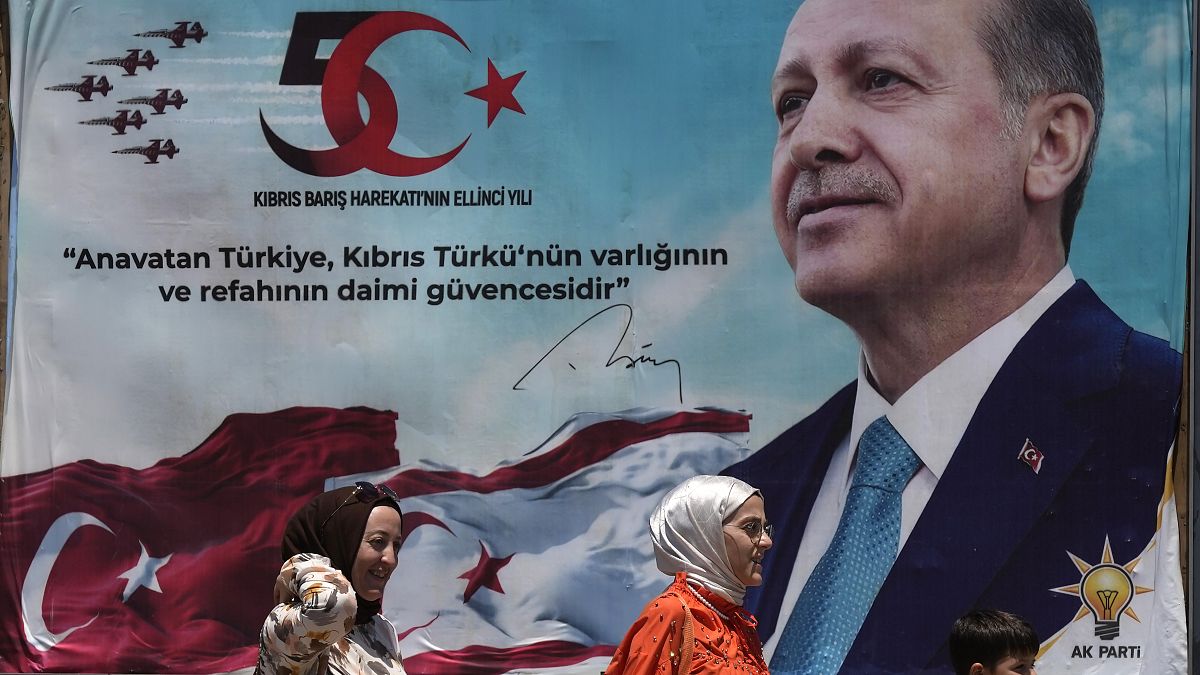The Annan Plan proposed the establishment of a United Republic of Cyprus, a federation of two states. It was put to a referendum in 2004 and was approved by 65% of Turkish Cypriots in the north but overwhelmingly rejected by Greek Cypriots in the south.
Türkiye’s president Recep Tayyip Erdoğan has poured cold water on a UN-backed plan for reunifying Cyprus, reaffirming his support for a two-state deal that Greek Cypriots have dismissed as a non-starter.
Speaking at an event in the north to mark the 50th anniversary of the Turkish invasion that split the island along ethnic lines, Erdoğan ruled out resuming talks based on the Annan Plan which proposed the establishment of a United Republic of Cyprus, a federation of two states.
That plan was put to a referendum in 2004 and was approved by 65% of Turkish Cypriots in the north. But more than 75% of the Greek Cypriots in the south rejected the proposed division of the island.
While Erdoğan has previously rejected the UN’s federation plan, Greece and Greek Cypriots had hoped he might soften his position.
“You cannot bathe in the same water twice. You won’t get anywhere by ignoring the facts on the island. We believe that a federal solution is not possible in Cyprus,” Erdoğan said.
His remarks may further complicate UN Secretary-General Antonio Guterres’ efforts to get both sides back to the negotiating table.
Erdoğan’s comments were echoed by Ersin Tatar, the current president of the territory known in Türkiye as the Turkish Republic of Northern Cyprus.
“The dominant and imposing attitude of the unchanging Greek Cypriot mentality has caused all negotiation processes to fail,” he said, referring to talks which have stalled since 2017.
“The Greek side still insists on a solution, under the name of a federal solution, in which the Turkish Cypriots will be in a minority position and turn Cyprus into a unitary structure within the European Union. This solution has the aim of destroying our state and sovereignty by demanding the removal of Türkiye as guarantor and intervention right and the removal of Turkish soldiers from Cyprus. Therefore, it is not possible for us to accept these goals.”
Meanwhile, on the other side of the UN-patrolled buffer zone, Cyprus’ president Nikos Christodoulides said he had received positive messages from the UN about resolving the Cyprus problem but took a swipe at Ankara for what he called the “violation of the human rights of the Cypriot people”.
“If Türkiye really wishes for conditions of security and stability in the region to prevail, if indeed Türkiye desires to come closer to the EU, with benefits for Türkiye itself, if Türkiye wishes to participate in the effort of the states of the region over regional stability and security, Türkiye knows very well the road to achieve that,” he said.
The anniversary of the Turkish invasion is markedly different on both sides of the border.
In the Turkish-controlled north it’s a festive occasion for those who view the invasion as salvation from the Greek-speaking majority’s domination.
But in the south, the day begins with the howl of air raid sirens at daybreak, a solemn day marking what Greek Cypriots remember as a catastrophe that left thousands of people dead or missing and displaced a quarter of the Greek Cypriot population.
Cyprus has been divided since 1974 when Turkish troops invaded in response to a coup by the Greek military junta which toppled the legitimate Cyprus government. Türkiye maintains around 35,000 troops in northern Cyprus.
The northern part, home to a majority of Turkish Cypriots and Turkish settlers, was self-proclaimed the Turkish Republic of Northern Cyprus in 1983, a territory recognised only by Türkiye.
Cyprus joined the European Union in 2004 and Brussels considers the whole island EU territory with Turkish Cypriots also considered EU citizens.

